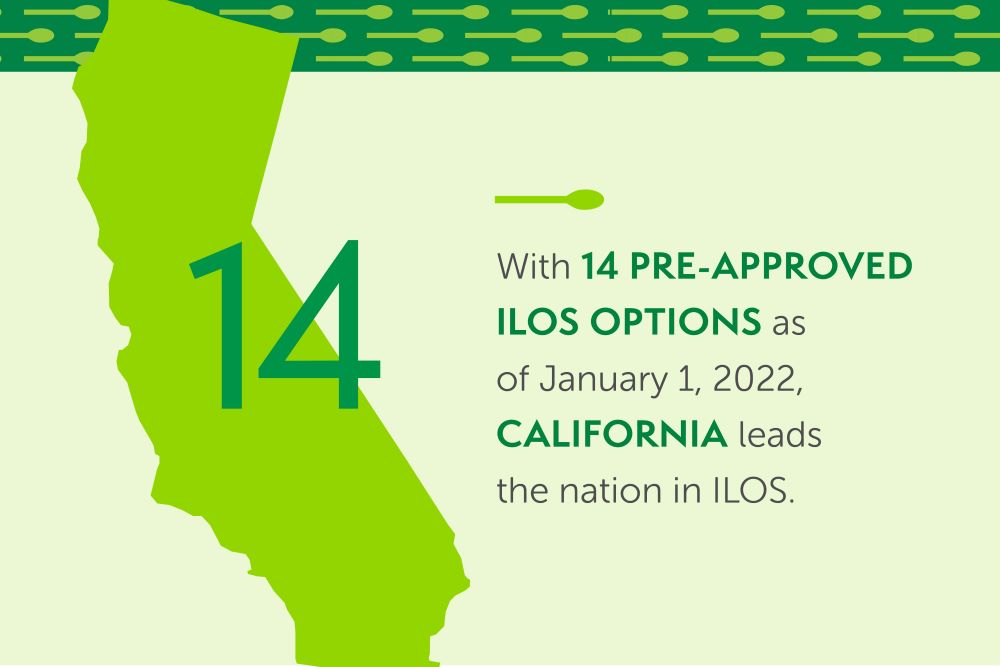All eyes are on California as the state embarks on innovative changes to Medi-Cal, its Medicaid program. To improve the quality of life and health outcomes for Medi-Cal members, the California Department of Health Care Services created a new, multiyear initiative called California Advancing and Innovating Medi-Cal (CalAIM). A centerpiece of CalAIM is a suite of non-medical benefits, commonly called ILOS or Community Supports (California’s nomenclature for the proposed list of state-approved In Lieu of Services/ILOS), which are cost-effective alternatives to standard benefits.
As of January 1, 2022, CalAIM offers 14 ILOS community supports including respite services, asthma remediation, personal care and homemaker services, and medically tailored meals. Managed care health plans participating in CalAIM are strongly encouraged to offer some or all of these approved ILOS community supports services to their members.
14 Approved ILOS in California
- Housing Transition Navigation Services
- Housing Deposits
- Housing Tenancy and Sustaining Services
- Short-Term Post-Hospitalization Housing
- Recuperative Care (Medical Respite)
- Day Habilitation Programs
- Caregiver Respite Services
- Nursing Facility Transition/Diversion to Assisted Living Facility
- Community Transition Services/Nursing Facility Transition to a Home
- Personal Care and Homemaker Services
- Environmental Accessibility Adaptations (Home Modifications)
- Asthma Remediation
- Medically Tailored Meals
- Sobering Centers
What is ILOS?
ILOS are medically appropriate and cost-effective alternatives to traditional medical services covered under a Medicaid plan. Once approved by the Centers for Medicare and Medicaid (CMS), these services can be substituted for various covered benefits. ILOS range from providing medically tailored meals and funding home modifications to housing support and sobering centers.
Why ILOS?
Upstream divers of health, also known as social determinants of health, are proven to have a major impact on people’s health. CMS’ support of ILOS gives health plans the flexibility to address UDOH and focus on preventative solutions to improve outcomes and reduce costs for members, particularly those with complex medical conditions needs. ILOS expenditures qualify as covered services for rate-setting, meaning their claims count toward the capitation rate. Today, only a handful of states have started offering ILOS, but these include the states with the largest Medicaid programs: CA and NY. Of states with programs or pilots, California’s Community Supports program is the most comprehensive in the nation.
Case in Point: California Home-Delivered Meals Pilot
A pilot program in California demonstrates how programs that address UDOH can work. In June 2021, 93 dually eligible members from a Medicaid Plan in California with congestive heart failure, with a minimum of four emergency department visits in the last 12 months and a high-risk profile, took part in a six-month pilot program of receiving lower-sodium medically tailored meals from Mom's Meals®. Participants also received other supports, including calls with registered dietitians, community health workers, and nurse case managers, as well as produce and pantry boxes to help them transition to healthy lifestyle habits.
Pilot results included:
- 42% reduction in inpatient acute admissions
- 39% reduction in inpatient length of stay
- 39% reduction in unavoidable hospitalization
- 40% reduction in emergency department conversions to inpatient
Results showed significant (p<.05) reductions in acute care utilization from pre-program to end of program for four measures, including inpatient acute admissions (41.7%), inpatient length of stay (39.4%), unavoidable hospitalization (39.1%), and ED conversions to inpatient (40%). Additional findings, however, showed that overall ED visits significantly increased (29.7%).
Significant decreases in self-reported swelling of hands, legs, and feet occurred between baseline and mid-program and between baseline to the end-of-program (p. <.0001). Although there were no significant changes between mid-program and end-of program, the self-reported reductions in swelling that occurred early in the program were sustained.
The pilot program was not without limitations, including but not limited to overlaps in the delivery of tailored meals and produce and pantry boxes, the small sample size, and other concurrent interventions, all of which limits the ability to generalize the study findings to a larger population.
Implementing ILOS
If you’re considering adding ILOS to your health plan, take these first steps to get started:
- Discuss options with your state’s Medicaid and Department of Health leaders
- Launch a pilot program to test non-medical benefits
- Talk to Mom’s Meals. As the leading national provider of home-delivered, medically tailored meals, Mom’s Meals is a valuable resource when it comes to developing strategies to promote ILOS. Rely on our expertise in partnering with managed care organizations and State Departments of Health in California and New York to help inform your program.
Mom's Meals can help
To learn more about the pilot or work with Mom’s Meals on a pilot of your own, contact Catherine Macpherson, MS, RDN, Senior Vice President, Healthcare Strategy & Chief Nutrition Officer at catherine.macpherson@mommeals.com or 844-280-2134.




